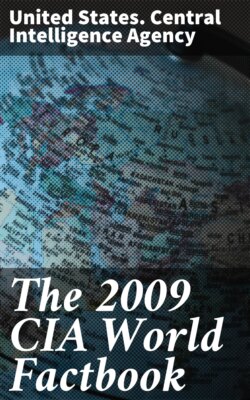Читать книгу The 2009 CIA World Factbook - United States. Central Intelligence Agency - Страница 244
На сайте Литреса книга снята с продажи.
NA
ОглавлениеCapital:
name: Road Town
geographic coordinates: 18 27 N, 64 37 W
time difference: UTC-4 (1 hour ahead of Washington, DC during Standard Time)
Administrative divisions:
none (overseas territory of the UK)
Independence:
none (overseas territory of the UK)
National holiday:
Territory Day, 1 July (1956)
Constitution:
13 June 2007
Legal system:
English law
Suffrage:
18 years of age; universal
Executive branch:
chief of state: Queen ELIZABETH II (since 6 February 1952); represented by Governor David PEAREY (since 18 April 2006)
head of government: Premier Ralph T. O'NEAL (since 23 August 2007)
cabinet: Executive Council appointed by the governor from members of the House of Assembly
elections: the monarch is hereditary; governor appointed by the monarch; following legislative elections, the leader of the majority party or the leader of the majority coalition is usually appointed premier by the governor
Legislative branch:
unicameral House of Assembly (13 elected seats and 1 non-voting ex officio member in the attorney general; members are elected by direct popular vote, 1 member from each of nine electoral districts, 4 at-large members; members serve four-year terms)
elections: last held 20 August 2007 (next to be held in 2011)
election results: percent of vote by party - VIP 45.2%, NDP 39.6%, independent 15.2%; seats by party - VIP 10, NDP 2, independent 1
Judicial branch:
Eastern Caribbean Supreme Court, consisting of the High Court of
Justice and the Court of Appeal (one judge of the Supreme Court is a
resident of the islands and presides over the High Court);
Magistrate's Court; Juvenile Court; Court of Summary Jurisdiction
Political parties and leaders:
Concerned Citizens Movement or CCM [Ethlyn SMITH]; National
Democratic Party or NDP [Orlando SMITH]; United Party or UP [Gregory
MADURO]; Virgin Islands Party or VIP [Ralph T. O'NEAL]
Political pressure groups and leaders:
The Family Support Network; The Women's Desk
other: environmentalists
International organization participation:
Caricom (associate), CDB, Interpol (subbureau), IOC, OECS, UNESCO (associate), UPU, WFTU
Diplomatic representation in the US:
none (overseas territory of the UK)
Diplomatic representation from the US:
none (overseas territory of the UK)
Flag description:
blue, with the flag of the UK in the upper hoist-side quadrant and the Virgin Islander coat of arms centered in the outer half of the flag; the coat of arms depicts a woman flanked on either side by a vertical column of six oil lamps above a scroll bearing the Latin word VIGILATE (Be Watchful)
Economy ::British Virgin Islands
Economy - overview:
The economy, one of the most stable and prosperous in the Caribbean, is highly dependent on tourism generating an estimated 45% of the national income. An estimated 820,000 tourists, mainly from the US, visited the islands in 2005. In the mid-1980s, the government began offering offshore registration to companies wishing to incorporate in the islands, and incorporation fees now generate substantial revenues. Roughly 400,000 companies were on the offshore registry by yearend 2000. The adoption of a comprehensive insurance law in late 1994, which provides a blanket of confidentiality with regulated statutory gateways for investigation of criminal offenses, made the British Virgin Islands even more attractive to international business. Livestock raising is the most important agricultural activity; poor soils limit the islands' ability to meet domestic food requirements. Because of traditionally close links with the US Virgin Islands, the British Virgin Islands has used the US dollar as its currency since 1959.
GDP (purchasing power parity):
$853.4 million (2004 est.) country comparison to the world: 206
GDP (official exchange rate):
$839.7 million (2003)
GDP - real growth rate:
1% (2002 est.) country comparison to the world: 176
GDP - per capita (PPP):
$38,500 (2004 est.) country comparison to the world: 23
GDP - composition by sector:
agriculture: 1.8%
industry: 6.2%
services: 92% (1996 est.)
Labor force:
12,770 (2004) country comparison to the world: 206
Labor force - by occupation:
agriculture: 0.6%
industry: 40%
services: 59.4% (2005)
Unemployment rate:
3.6% (1997) country comparison to the world: 43
Population below poverty line:
